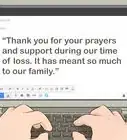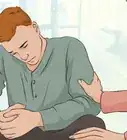This article was co-authored by Trudi Griffin, LPC, MS. Trudi Griffin is a Licensed Professional Counselor in Wisconsin specializing in Addictions and Mental Health. She provides therapy to people who struggle with addictions, mental health, and trauma in community health settings and private practice. She received her MS in Clinical Mental Health Counseling from Marquette University in 2011.
There are 8 references cited in this article, which can be found at the bottom of the page.
wikiHow marks an article as reader-approved once it receives enough positive feedback. In this case, 100% of readers who voted found the article helpful, earning it our reader-approved status.
This article has been viewed 120,869 times.
Losing a friend or loved one can be one of the hardest parts of being human. It may be difficult to move on with life without that person being there. Overcoming grief is a unique process because everyone grieves differently. Learn some tips to process your loss and cope in a healthy way.
Steps
Reacting to the Death
-
1Know that there is no right or wrong way to grieve. While there may be some common ways that people often react to death, no two people will react or learn to cope with the death in the exact same manner or time frame.
- You may notice some people around you either seem to be much more affected by the death or not bothered by it. Be careful not to assume they do not care. A family member may find comfort in staying busy and focusing on other things—this is just the way he or she deals with the death.
- Grieving is not about who is the most upset. It’s a very personal thing. You may also find that everyone around you has some sort of suggestion about moving on or how it gets easier. This advice may or may not be helpful to you. Just keep in mind that they mean well and are also trying to cope with the death and also be there for you.
-
2Be aware of the common reactions to death. You may see both physical and emotional reactions to the death that depend on several factors. Knowing these helps you to understand that grieving can look very different. Your feelings are adequate and real no matter how you might express them. [1]
- Physical reactions to the death may manifest as dizziness, physically throwing up or feeling like you are going to, numbness, disorientation, headache or body pains, or not being able to sleep or the opposite where you feel all you can do is sleep.
- Emotional reactions may include sadness, confusion, denial about what happened, anger, and guilt.
- Certain factors may influence how you grieve a particular death. These include, but are not limited to, the relationship you had with the person who passed, the age of the person, the person’s health at the time he or she died, and whether the death was something you were anticipating.
Advertisement -
3Anticipate the different stages of grief. While most people will go through each stage of grief, there is no time frame or correct way to do so. You also may find you don’t go through all the stages and that is fine, too. The stages of grief might look like:[2]
- Denial- “This can’t be true. I just talked to her.”
- Anger- Needing to know who is to blame or how it happened
- Bargaining- “Take me instead.”
- Depression- “I can’t go on alone.”
- Acceptance- “I know she is not in pain anymore.”
- Many people assume that it is wrong to feel angry about things or feel out of place if those around you are feeling differently about the death. Try to not punish yourself for the way you feel, just be aware that the emotions may come and go.
-
4Give yourself time. There is no hard and fast time frame to get back to “normal,” so don’t try to push yourself into things you are not ready for. While some routines may help you cope like returning to work to keep yourself busy, you may find other routines never fully recover. There is no right or wrong way to deal with the change.[3]
- One thing to keep in mind when taking the time you need: even though your world may seem upside down, the world around you still goes on. Reach out to get help if you need someone to make sure you are staying in contact with work if you are not able to attend or keeping up with the daily bills to avoid forgetting to pay something important like rent.
Getting Support
-
1Spend time with loved ones who knew the person. Don’t be afraid to talk about the person and share all types of memories. Part of being a support also means not having to talk about the person all of the time. Everyone will be dealing with it in their own way so it’s also fine to leave things unsaid and just spend time making sure everyone is OK.[4]
- Include children and younger family members in these groups when it is possible. Kids need to see they do not need to hold in their feelings. Crying is OK to do in front of others and this includes the kids.
-
2Look for solace in your spirituality. Spirituality for some means turning to religion but it doesn’t have to if that is not a regular part of your life. You may find whatever you believe occurs after death is a way to find peace in the death of a loved one. Take whatever time you need to talk about this with others who share your beliefs. [5]
- You may also choose to pray, meditate, or take walks in nature to ease your grief.
-
3Participate in a bereavement support group. In the months after the death, you will find those around you talk less about it, but a group setting can help you feel like you can still talk about it on a regular basis with people who have been there. [6]
- To find a group, you can reach out to a variety of sources including groups specific to the type of death (like cancer survivors group, or families of crime victims) or those that are religious based if you feel that is a good fit. Many hospitals also offer support groups as well.
- You will probably find the group setting either really helpful or not. You can test the waters to see which type of outside supports work best for you. If it's unhelpful, you may find that one-on-one counseling with a grief specialist works.
-
4Look after yourself physically. While emotional reactions are expected after a death, there are also physical symptoms to grief. Loss of appetite, nausea and stomach pain, intestinal upset, and sleep disturbances/loss of energy often present themselves when someone is experiencing grief.[7] By taking care of your body, you can also help to heal your mind.
- Do your best to get enough sleep and eat right. Exercise is a good way to help increase your ability to sleep and eat. In addition, it causes your body to produce endorphins, which will help lift your mood.[8] Avoid using drugs or alcohol to "numb the pain."[9]
- If, no matter how hard you try, you have trouble keeping a regular appetite and sleep habits, you may need to talk to a professional. Sometimes, people who are grieving experience symptoms of depression, which must be addressed in order to fully heal.
Finding Closure
-
1Attend the memorial service. It may seem overwhelming to think about going, but it is often healing to participate in the rituals tied to paying your respect and will help you connect with others who are also dealing with the death. [10]
- Many people become almost obsessed with the “perfect” funeral, and feel like they can only pay their respects by putting on a lavish ceremony. Honor the person in the best way you can and know that small things that go wrong really won’t be remembered.
- If the service is uncomfortable due to differing religious beliefs, try to at least participate in parts of the services whether it is a graveside service outside of the church or a private viewing. Many memorials offer flexible options to participate either in a bigger service or attend a private viewing of the body without the religious service.
-
2Reminisce about the person’s life. Look at pictures. Share and tell funny stories. It’s OK to laugh even after someone has passed away. Take the funny memories forward along with all the other memories. You will find many family members will enjoy just laughing and sharing the history.[11]
-
3Plan a solo trip to the burial location. Give yourself the opportunity during this alone time to cry as much as you need to, talk to your loved one if you want to and just do whatever feels right in the moment. Unlike the funeral setting, no one is watching so this is your time to say goodbye or reminisce with your loved one.[12]
- Visit as often as you feel you want to. Some people feel comfort in regular trips just to chat with the loved one while others may not feel connected to the gravesite. There is no right or wrong way to handle visits.
-
4Write a letter to say goodbye. If the passing was not expected, you may feel like there were things left unsaid—so say them.[13] Don’t get hung up on what to do with the letter after you write it. You will find a solution that seems to fit. Focus on putting your thoughts on paper and getting closure. Afterwards, you may choose to share it with another loved one or even read it aloud at the grave site.
-
5Use your grief to enact change. Sometimes, you may find closure by making a difference after the death. Take action in some way to help other people who may be in your shoes someday.
- For example, if your loved one died of cancer, you might start a foundation to spread awareness. If he or she passed after an accident, you can use your energy to prevent future accidents of the same kind.
- Take this act of change one step further and honor the name of your loved one by starting a scholarship in memory or name the foundation after the one who passed. Incorporate the life story of your loved one in the story of the foundation. This is a terrific way to maintain his or her legacy with a positive contribution to society.
References
- ↑ http://au.reachout.com/common-reactions-to-death
- ↑ http://www.helpguide.org/articles/grief-loss/coping-with-grief-and-loss.htm
- ↑ http://us.reachout.com/facts/factsheet/after-someone-dies-moving-back-into-your-routine
- ↑ http://kidshealth.org/en/teens/someone-died.html#
- ↑ http://www.helpguide.org/articles/grief-loss/coping-with-grief-and-loss.htm
- ↑ http://kidshealth.org/en/teens/coping-grief.html?WT.ac=t-ra
- ↑ http://www.helpguide.org/articles/grief-loss/coping-with-grief-and-loss.htm
- ↑ http://www.mayoclinic.org/healthy-lifestyle/stress-management/in-depth/exercise-and-stress/art-20044469
- ↑ http://www.helpguide.org/articles/grief-loss/coping-with-grief-and-loss.htm

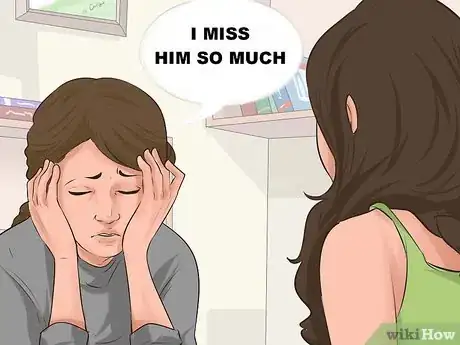
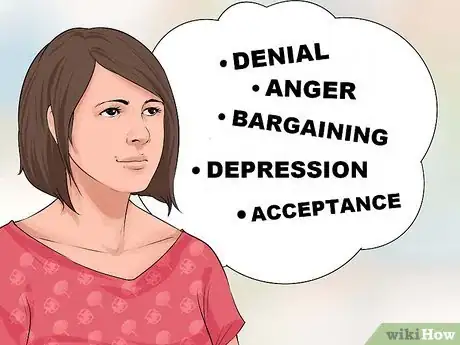



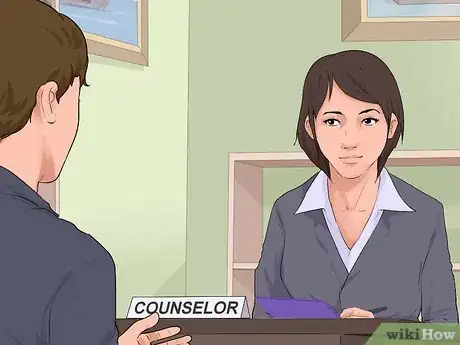



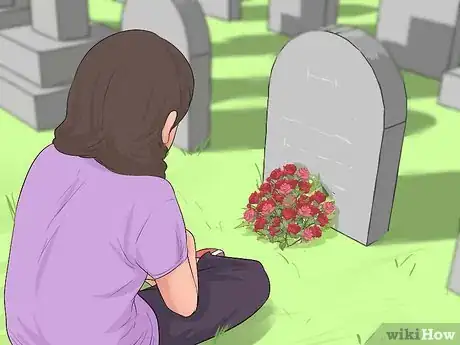
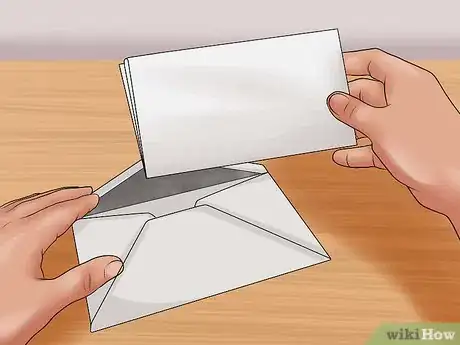
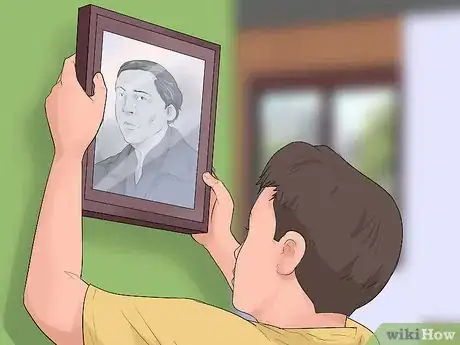


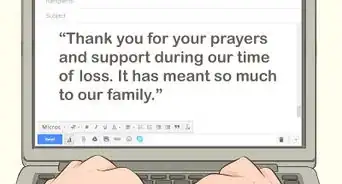

-Step-20-Version-2.webp)





















